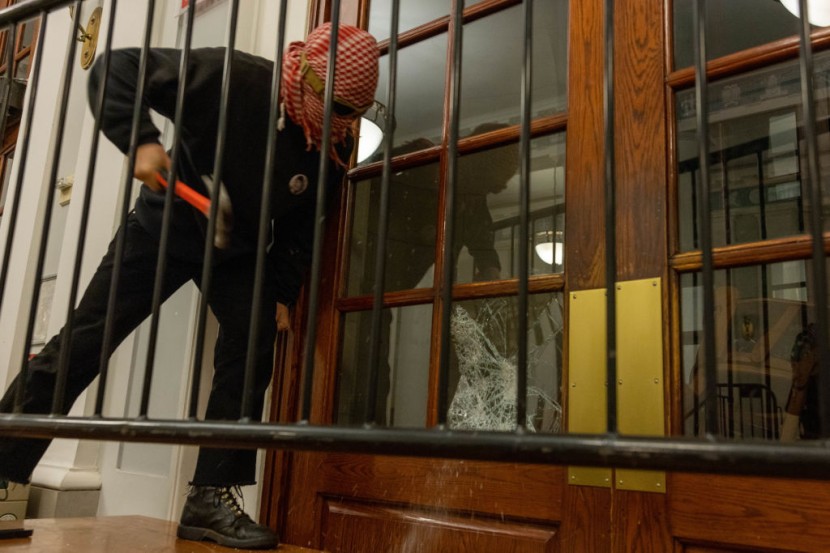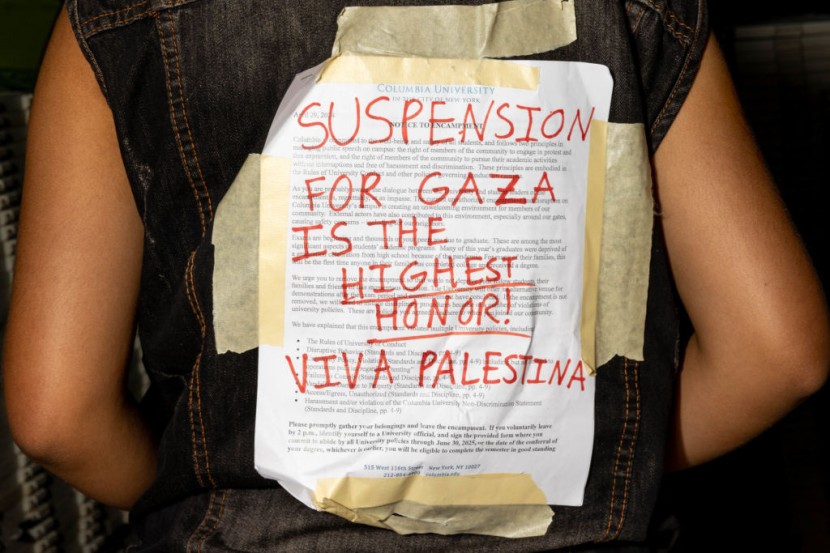
Columbia University locked down its campus on Tuesday morning as pro-Palestinian activists defied orders to disband their encampment and instead seized control of the college's Hamilton Hall - where they plan to remain until the university severs all financial ties to Israel.
"After 206 days of genocide and over 34,000 Palestinian martyrs, Columbia community members took back Hamilton Hall just after midnight," Columbia University Boycott Divestment and Sanctions (BDS) wrote in a press release.
"An autonomous group reclaimed Hind's Hall, previously known as 'Hamilton Hall,' in honor of Hind Rajab, a Gazan martyr murdered at the hands of the genocidal Israeli state at the age of six years old."
Around 3:00AM at "Hind's Hall," Columbia students chant:
— Prem Thakker (@prem_thakker) April 30, 2024
"Went down to Columbia
And I took back what they stole from me
Took back my dignity
Took back my humanity
Now they're under our feet, under our feet
under our feet, under our feet
Ain't gonna let no system walk all over me" pic.twitter.com/XWwrha4P2f
The Columbia campus - which was already restricted to people with university IDs and others let on campus on a case-by-case basis - is now solely open to students who reside in one of the seven on-campus dorms and staff members performing essential functions. The only point of entry on campus is the 116th Street and Amsterdam gate - while other gates will remain locked, according to the Columbia website.
"This access restriction will remain in place until circumstances allow otherwise," the website said.
Discord between the Columbia student activists and the university administration has raged for two weeks - since students first erected the Gaza Solidarity Encampment on the university grounds. The student protestors are calling for divestment from Israel, transparency into the college's finances and amnesty for all students involved in the activist groups.

After an initial attempt to clear the encampment resulted in the arrest of more than 100 Columbia and Barnard students and widespread condemnation of university President Minouche Shafik, the Columbia administration began negotiations with the student activists.
"Since Wednesday, a small group of academic leaders has been in constructive dialogue with student organizers to find a path that would result in the dismantling of the encampment and adherence to University policies going forward," Shafik wrote in a Monday morning statement.
"While the University will not divest from Israel, the University offered to develop an expedited timeline for review of new proposals from the students by the Advisory Committee for Socially Responsible Investing, the body that considers divestment matters."
Shafik also wrote that the student activists had made life on campus "intolerable" for many Jewish students. The politics of the encampment have been subject to intense scrutiny from the beginning - there were Jewish activists involved in occupying the lawn and participating in associated activist groups. Students and faculty members even celebrated a Passover Seder inside the encampment.
Some, however, allege that the activism has led to a spike in on-campus antisemitism - with at least one rabbi associated with the university urging Jewish students to return home. Columbia Students for Justice in Palestine and its members have made repeated public statements asserting that Jewish students are a welcome part of their movement and that their issues are with the Israeli government and the university's administration.
The student activists allege that the university is not acting in good faith - both by not providing amnesty to all student protestors and by threatening students with the loss of on-campus services like housing and dining halls.

"Students and community members are risking suspension and arrest to end the true statement of emergency on campus, Columbia's complicity in the genocide in Gaza. Taking back our own campus is the only and last response to an institution that obeys neither its own 'rules' nor ethical mandates," Columbia BDS wrote in their statement. "Do not incite another Kent or Jackson State by bringing soldiers and police officers with weapons onto our campus. Students' blood will be on your hands."









